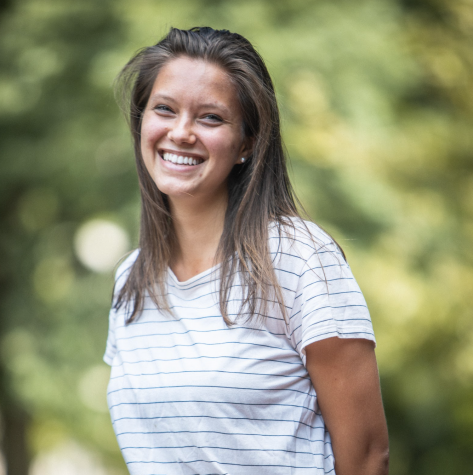Vanderbilt’s Immigration Practice Clinic originated in 2017 when Dr. Karla McKanders joined Vanderbilt University as a clinical professor of law. In the semester-long clinic, law students represent individuals from all over the world who would otherwise not be able to afford an attorney for their case. The immigration cases must be humanitarian in nature, in order to be considered by the IPC, and often feature issues of asylum, naturalization or Special Immigration Juvenile Status.
The IPC is one of eight legal clinics at Vanderbilt. Others include the First Amendment Clinic, the Youth Opportunity Clinic and the Criminal Practice Clinic. In general, each aims to provide law students with a chance to put what they study into practice.
“The Immigration Clinic is a part of that larger goal of giving students experience before they graduate,” said McKanders, “and also instilling the public service ethic in them.”
Eight students participate as student attorneys in the IPC each semester. At the beginning of the clinic, they receive intensive training on immigration law and procedures. Throughout the semester, McKanders meets with each group on a weekly basis to oversee the progression of their assigned case.
This semester participating students will represent appellate cases before the Sixth and Eleventh Circuit Courts of Appeals. In these cases students dispute the unfavorable decision of an immigration judge in a lower court.
Such advocacy addresses a pressing need in Tennessee.
“In Tennessee specifically, there is an issue with people finding representation when they have to go to immigration court, because immigration court is in Memphis,” said McKanders. “And so once you get outside of Memphis there aren’t that many immigration attorneys.”
Since the government is not required to provide an attorney to defendants in civil cases, this lack of adequate representation hinders many individuals’ cases.
“In general, if you can’t afford an attorney, it makes it even more difficult to access the court system,” said McKanders.
McKanders herself became interested in Immigration Law as a student at Spelman College in Atlanta. During her junior year of college, she studied abroad in France, and did social work with refugee populations.
“That was my first experience working with immigrant, refugee population,” said McKanders. “That– plus the studies I was engaging in in terms of human rights –really made a connection for me between human rights and civil rights.”
Her experience abroad inspired her to continue similar work in her community back home.
“After that I came back to Atlanta, where my college is located, and I recruited all my friends to work at refugee centers, volunteering and tutoring resettled refugees in Atlanta,” said McKanders. “And I decided that that’s a work that I wanted to do.”
After graduating from Duke University School of Law in 2003, McKanders worked as a law clerk on the Sixth Circuit Court of Appeals, where she handled appeals from immigration courts. McKanders observed startlingly varied degrees of competence in the attorneys who handled these cases. This sparked her interest in clinical teaching. The law clinics such as Vanderbilt’s IPC combine two elements she cares deeply about: preparing students for professional legal practice and serving the community around her.
This kind of dedication is indispensable considering the challenging cases the IPC takes on.
“They’re really hard cases,” said McKanders, “especially because my students are listening to and advocating on behalf of people who have experienced trauma.”
Many individuals fled their countries to escape threats, political persecution, torture, or violence. Often, they also encounter high danger or brutal crime during the journey itself. Student attorneys in the IPC receive additional guidance to help negotiate these traumas.
“We work on, how do you deal with experiencing secondary trauma yourself when you’re hearing someone’s story over and over again?” said McKanders. “And then how do you work with a client who has experienced trauma? We often have an expert witness– a psychologist who comes in on the case and will evaluate the client and give recommendations.”
Language difference often forms yet another obstacle in these cases.
“In practice for attorneys in general, and not just the immigration practice, you increasingly are working with people around the world,” explained McKanders.
To deal with this language barrier, the IPC relies heavily on volunteers from the Vanderbilt community and student organizations like AMIGOS to translate legal documents or interpret conversations. Students can sign up to volunteer at the IPC here.
“If we have more nuanced languages, like dialects specific to a country, then sometimes we have to rely on professional interpreters,” said McKanders. “When we go to court, we definitely rely on professional interpreters.”
In spite of these challenges, the positive impact of the IPC’s work for individuals and the community makes it worthwhile. And even if they’re not planning to practice immigration law, participating students gain invaluable experience.
“The students in the clinic go into a wide variety of practice areas,” McKanders reported, “and my experience has been, as a professor, that once students actually do a case in the clinic– no matter what area of practice they’re in –once they go out, they can always take on an immigration case on a pro bono basis.”
McKanders hopes the clinic’s work may have larger repercussions as well.
“Right now, immigration is a very challenging issue nationally, and there are so many ways in which the students can be impactful in their advocacy,” she said. “Right now, we’re working on appellate litigation cases, and those appellate cases really, especially federal appellate cases, have the ability to impact what’s going on at the administrative level with different policies. The hope is that we can make some contribution through our advocacy in terms of shaping immigration laws– humanitarian immigration, specifically.”



